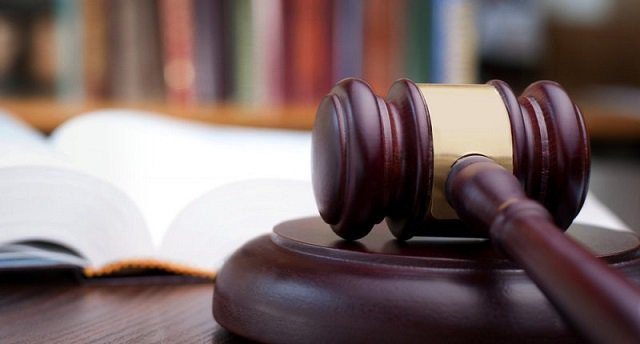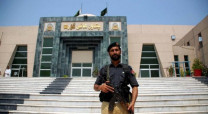Judges ‘disagree’ on harnessing suo motu powers
Future CJPs to continue to apply varying approaches to public interest litigations

Representational image. PHOTO: REUTERS
“The issue of the exercise of jurisdiction under Article 184 (3) of the Constitution was discussed threadbare from all possible angles and it was affirmed that such jurisdiction will be exercised in accordance with the Constitution,” say minutes of the February 6 full court meeting.
The Chief Justice of Pakistan (CJP) Asif Saeed Khosa had called the full court to consider the amendment in order XXV Supreme Court Rules relating to the exercise of powers under Article 184 (3) of the Constitution as proposed by the Supreme Court Bar Association (SCBA) last year.
The SCBA former president Peer Kaleem Khursheed had submitted proposed amendments to the SC rules to regularise the public interest jurisdiction under Article 184 (3).
Talking to The Express Tribune, Khursheed said the bar had recommended rules guiding where the SC should exercise public interest jurisdiction and where it should not. The bar had proposed that the right to appeal should be given against verdicts rendered under Article 184 (3) of the Constitution, he said.
Legal experts believe that there is no consensus among the SC judges to regulate the public interest jurisdiction and giving right to appeal in suo motu cases through amending the SC rules.
Renowned lawyer Faisal Siddiqi said this proves the disagreement among judges regarding the parameters and interpretation of Article 184(3). “Thus, the only bare minimum agreement among them is that they will act in accordance with the Constitution, which resolves nothing as each judge has his own interpretation of the constitutional provision of Article 184(3),” he said.
Divide on use of suo motu powers
The former attorney general for Pakistan Irfan Qadir, who has been a strong critic of the suo motu jurisdiction in the past, said the full court’s decision was very unfortunate. He added the SC uses suo motu powers to regularise politics by applying Article 62 (1) of the Constitution and maintaining good governance in the country, which is not its domain.
“Where it is written in the Constitution or the judges’ code of conduct that the apex court will intervene in governance issues due to executive’s failure?” he questioned.
Qadir also lamented that the court exercising quo warranto jurisdiction had ousted a number of political leaders, judges and civil servants but there is no check on the court’s authority. He said it was about time the parliament looked into the matter so that tracheotomy of power could not be violated further.
Another lawyer, who requested anonymity, said when the superior judiciary has structured discretionary powers of executive authorities including the prime minister then it must also regulate the CJP’s unfettered powers of suo motu and constitution of benches.
“If the judiciary does not regularise the public interest jurisdiction then parliament might take up the issue, which may become a source of tension among institutions,” he adds.
The CJP Khosa in his first speech on January 17 said either through a full court meeting or through a judicial exercise an effort shall be made to determine and lay down the scope and parameters of the exercise of the original jurisdiction of this court under Article 184(3).
“And, if deemed appropriate, to carve out the scope of an intra-court appeal in such matters through an appropriate amendment of the Supreme Court Rules or to suitably amend the provisions relating to review jurisdiction so as to enlarge its scope in such cases,” he said.
The CJP also said suo motu exercise of this court’s jurisdiction under Article 184(3) of the Constitution shall be exercised very sparingly and only in respect of larger issues of national importance where either there is no other adequate or efficacious remedy available or the available constitutional or legal remedies are ineffective or are rendered incapacitated.
The power of suo motu
Senior lawyers believe that there will be a challenge for the CJP, who is retiring in December, to evolve a consensus among the SC judges to regulate suo motu powers by amending SC rules.
Both the leading opposition parties – the Pakistan Muslim League-Nawaz (PML-N) and the Pakistan People’s Party (PPP) – faced a tough time due to use of suo motu powers by the apex court and a number of politicians faced disqualification.
Suo motu powers should be exercised in public interest matters but politicians have been its victim. The Article 225 says no election dispute can be called in question except election petitions but dozens of lawmakers have been disqualified while exercising jurisdiction of quo warranto under Article 184 (3).
Interestingly, there is no option of filing appeal against the judgment in a suo motu case. The PPP’s latest manifesto also states that Article 184(3) has been used in ways that “did not inspire great confidence in its use by courts in human rights issues.”
Both the senior-most judges, Justice Gulzar Ahmad and Justice Sheikh Azmat Saeed, were part of the bench led by former chief justice Iftikhar Chaudhry, which heard several public interest matters.
Justice Gulzar, who is next in line to become the CJP and will hold the post for over two years, has already initiated proceedings of public interest litigation for removal of encroachments from Karachi.
Likewise, Justice Sheikh Azmat has authored two rulings, wherein the jurisdiction of quo warranto to examine the qualification of lawmakers under Article 62 (1) (f) of the Constitution has been extended last year.
He also endorsed the formation of a joint investigation team (JIT) to probe into the Panama Papers case. He does not spare executive authorities regarding the enforcement of fundamental rights in the country. However, Justice Sheikh is retiring in August. After analysing past judgments, it can be said that future chief justices have also varying approaches to public interest litigation.



















COMMENTS
Comments are moderated and generally will be posted if they are on-topic and not abusive.
For more information, please see our Comments FAQ